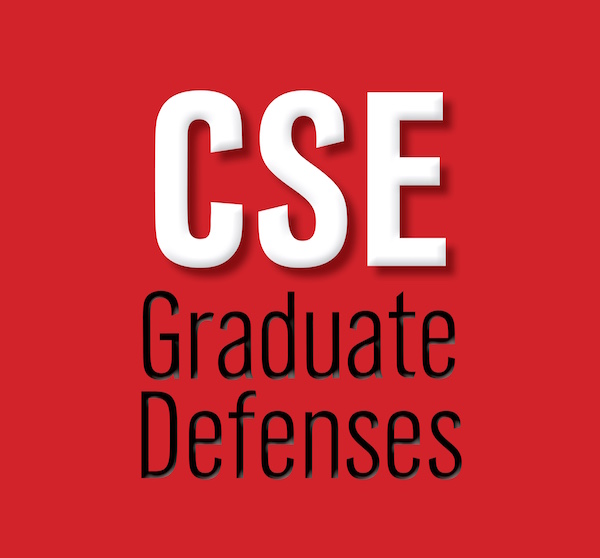
Master's Thesis Defense: Pedro Lucas Franca Albuquerque
Monday, December 2, 2019
9 a.m.
211 Schorr Center
Committee Members: Dr. Carrick Detweiler (Advisor), Dr. Justin Bradley, and Dr. Stephen Scott
"Domain Adaptation in Unmanned Aerial Vehicles Landing Using Reinforcement Learning"
Abstract: Landing an unmanned aerial vehicle (UAV) on a moving platform is a challenging task that often requires exact models of the UAV dynamics, platform characteristics, and environmental conditions. In this thesis, we present and investigate three different machine learning approaches with varying levels of domain knowledge: dynamics randomization, universal policy with system identification, and reinforcement learning with no parameter variation. We first train the policies in simulation, then perform experiments both in simulation, making variations of the system dynamics with wind and friction coefficient, then perform experiments in a real robot system with wind variation. We initially expected that providing more information on environmental characteristics with system identification would improve the outcomes, however, we found that transferring a policy learned in simulation with domain randomization to the real robot system achieves the best result in the real robot and simulation. In this thesis, we compare the results of multiple deep reinforcement learning approaches trained in simulation and transferred in robot experiments with the presence of external disturbances. We were able to create a policy to control an Unmanned Aerial Vehicle completely trained in simulation and transfer it to a real system with the presence of external disturbances. In doing so, we evaluate the performance of dynamics randomization and universal policy with system identification.
Master's Thesis Defense: Saeideh Samani
Monday, December 2, 2019
10 a.m.
19 Avery Hall
Committee Members: Dr. Hongfeng Yu (Advisor), Dr. Haishun Yang (Co-Advisor), Dr. Mohammad Rashedul Hasan, and Dr. Lisong Xu
"Exploring Nitrogen Leaching Using Uncertainty Visualization"
Abstract: Nitrogen (N) is an essential nutrient for many crops including corn and soybean. However, its leaching into groundwater is a serious cause of concern for environmental and public health. The amount of N leaching is closely linked to soil water drainage and rainfall. Prediction of N leaching in cropping systems is critical to the improvement of crop management through the reduction of N leaching. Visualizations can help understand uncertainty in the prediction of N leaching in soil and water through the execution and analysis of numerous simulations. The uncertainty in N leaching originates from uncertainty in many parameters such as weather prediction data, soil data, and the information entered by the user (e.g. N fertilizer). Uncertainty can cause nitrogen loss and consumption. We developed a platform that assists agricultural scientists in comprehending the relationship between various input parameters and N leaching. Our platform reveals N leaching with analysis of uncertainty. In addition, we have illustrated N leaching using different methods including heat-map, contour map, and 3D visualization.
Dissertation Defense: Mohannad Alhanahnah
Monday, December 2, 2019
9 a.m.
103C Avery Hall
Committee Members: Dr. Hamid Bagheri (Advisor), Dr. Qiben Yan (Co-Advisor), Dr. ThanhVu Nguyen, Dr. Witawas Srisa-an, and Dr. Hamid Sharif
"Advanced Security Analysis for Emergent Software Platforms"
Abstract: Emergent software ecosystems, boomed by the advent of smartphones and the Internet of Things (IoT) platforms, are perpetually sophisticated, deployed into highly dynamic environments, and facilitating interactions across heterogeneous domains. This complexity is driven by the tight integration of many non-traditional actors, which involve platform developers, device vendors, library providers, application developers, application publishers, and end-users. This tight integration creates opportunities as well as unique challenges, as the involving actors in such emergent ecosystems have different capabilities and incentives, whose interactions may expose severe vulnerabilities. Accordingly, assessing the security thereof is a pressing need, yet requires high levels of scalability and reliability to handle the dynamism involved in such volatile ecosystems.
This dissertation seeks to enhance conventional security detection methods to cope with the emergent features of contemporary software ecosystems. In particular, it analyzes the security of Android and IoT ecosystems by developing rigorous vulnerability detection methods. A critical aspect of this work is the focus on detecting vulnerable and unsafe interactions between applications that share common components and devices. Contributions of this work include novel insights and methods for: (1) detecting vulnerable interactions between Android applications that leverage dynamic loading features for concealing the interactions; (2) identifying unsafe interactions between smart home applications by considering physical and cyber channels; (3) detecting malicious IoT applications that are developed to target numerous IoT devices; (4) detecting insecure patterns of emergent security APIs that are reused from open-source software. In all the four research thrusts, we present thorough security analysis and extensive evaluations based on real-world applications. Our results demonstrate that the proposed detection mechanisms can efficiently and effectively detect vulnerabilities in contemporary software platforms.